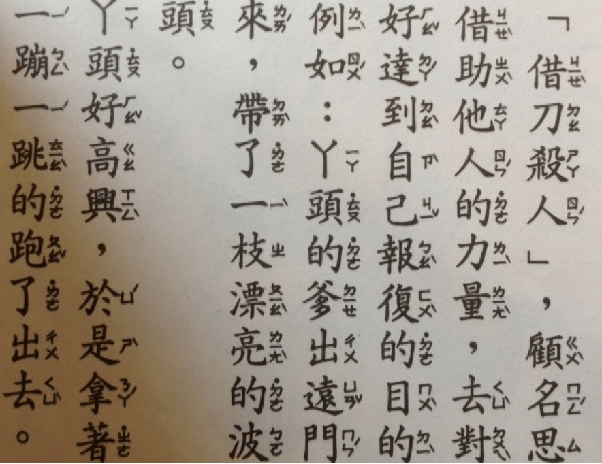It is extremely difficult, its not a matter of just what you put into it like with other languages. Somewhere, I read an article from a linguistics major student, saying how he felt that with the same time of 5 years, He compared his 5 years learning Arabic, French, and Chinese. He concluded that you’d be more advance in 5 years in most languages but not Chinese. From my American experience, ABC’s (American born Chinese), people often praise me for my mandarin. Because they are comparing me to not being a native. Rather comparing someone outside learning Chinese. When I compare my ability to a native, an elementary school kid is probably far more advanced than me.
I recall all the rigorous workbooks I had to do, writing characters in boxes, then having to learn Taiwan’s method Bopomofo (Zhuyin) where I additionally had to learn more “characters” that are essentially alphabets that go on the ride side of each character. See those additional vertical characters on the side? and accent points? this is Zhuyin. Mainland China teaches the writing in pinyin. Which is easier for Westerners.

This is how I learned to read the character. On top of that, the language now is simplified, and I learned traditional. Often times even the characters don’t look similar. Got to memorize all over again a lot of words.
The Chinese dictionary: If you wanted to find an English word, you just have to know how to spell it out by sound. In Chinese, you have to know how it already is written to find it. You can find it by the amount of strokes and/or the symbol it governs. The writing is just memorizing a picture lol…even natives forget what a character is suppose to be written as. So they would go look it up and once they see it, they know that what they wrote was just missing a dash somewhere. Now if you have a textbook in front of you, you still have to learn how the character is composed by strokes/symbol. Go to the dictionary and see its definition. Which is another set of characters…see my drift?
Lets talk about “cognates”, there is very little words in English that exist in Chinese. You want to translate a feeling, thought, tone, sarcasm..an expression, you would have to learn the cultural/historical to understand what CHINESE expression, word would be. Not the other way around.
Grammar: Chinese sentences follow a Subject-Verb-Object format, but the grammar structure differs greatly from English. For starters, Chinese lacks inflection, conjugation and tense. Instead, context and particles denote time and relationship. The way you say “have you eaten” “did you eat” is only in present tense. how does one ask someone in English if they “eaten” in present tense? “do you eat?” based on if its after morning, lunch, dinner. It implies past tense, future tense. Putting words in the wrong order can completely change the meaning of a sentence.
Cultural separation. Even if you can’t speak Spanish, you could look at a Spanish text and identify potential words and its meanings. You could hear a song and say “OH that’s the macarena!” “oh that’s”…There is such a separation of Chinese cultural to the rest of the world. Makes learning the language also difficult. Chinese has very complex cultural rules around formality, saving face, and showing respect. The wrong verbiage can cause serious offense or misunderstandings. Such as, sarcasm isn’t really a thing. If you said something in a sarcastic way, its just rude to them.
Different regions can change the way the language sounds like. Its like English. You have British accents (and its deviations) then southern American accent “hi yawl, bless your heart”. Aussies have another way. Beijing Chinese speakers have a very heavy curled sound. Hard to understand. There are over 80 dialects of Chinese spoken throughout China. Exposure to just textbook Mandarin Chinese may leave you confused by colloquial slang terms and strong regional accents.
Lack of immersion opportunities, I been studying it every Saturday since I was 5 in Northridge, CA (EMPHASIS LMAO). It wasn’t till my Uni days, it improved drastically because I was hanging out with Taiwanese people. I was going karaoke, going to get tea with them, I was literally immersing myself with native Chinese speakers. In 2 months, I learned to speak more and more… but writing and reading never really took off.
Then I see people that isn’t even Chinese like on instagram “mandarin Kyle” or kyle strickland.,,and he blows my mind just thinking how much he put into it. He speaks better than an abc and also got the cultural stuff down. I believe he spent a lot of time there studying too.
So though it is difficult, its not impossible. One thing is for certain, you must have complete immersion for Chinese in order for the language to really stick. Daily dedication and constant use. If you can’t go to China or even Taiwan. Find a buddy to practice with and that is serious about it.